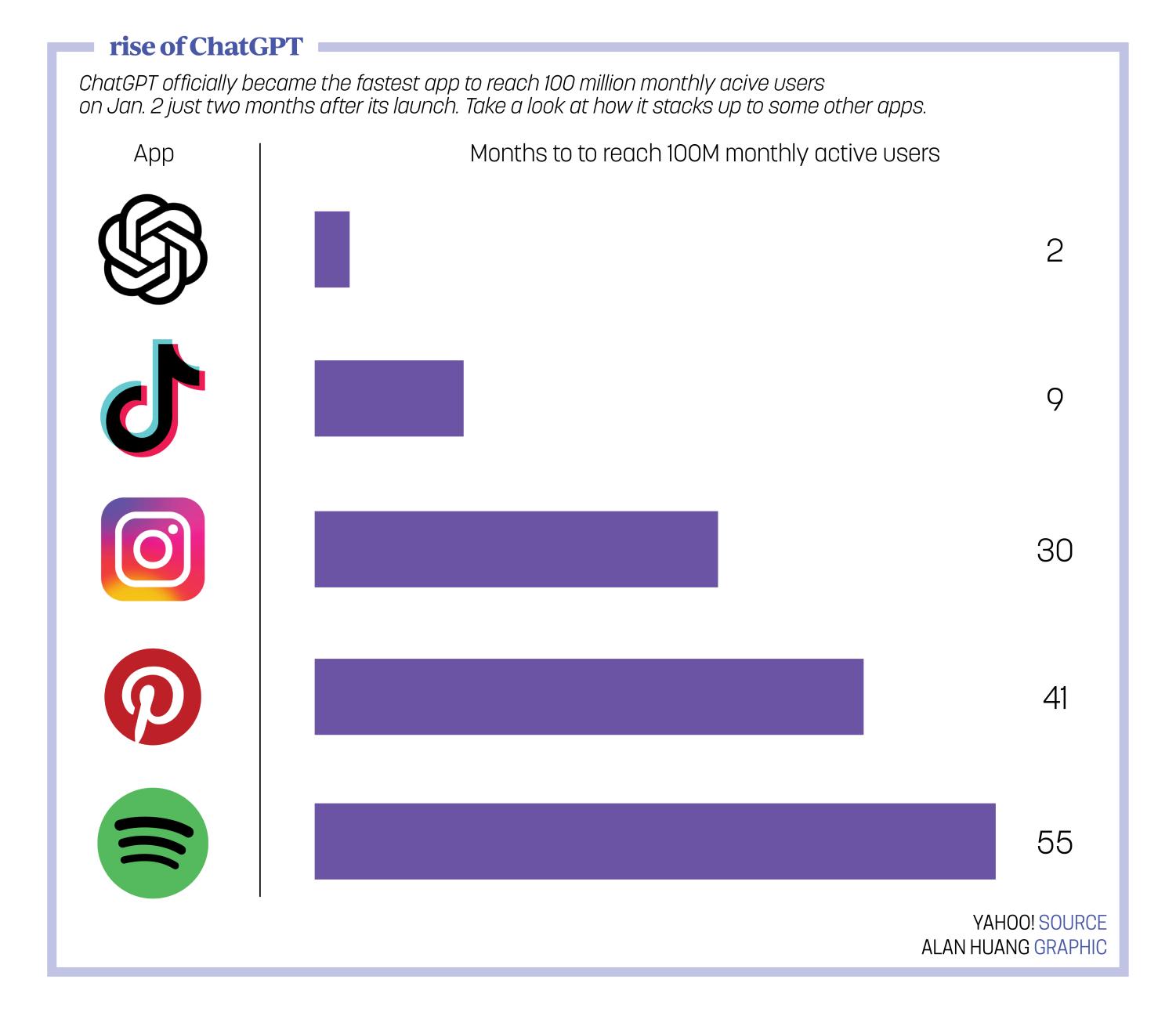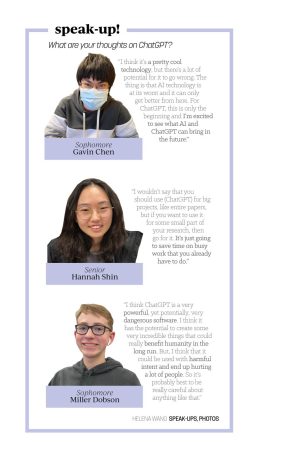
ChatGPT, a natural language processing tool driven by AI technology, launched on Nov. 30, 2022. This technology allows you to have human-like conversations and much more with a chatbot, leading to its quick rise in fame, reaching 100 million users within two months, faster than social media platforms like TikTok which took nine months to reach 100 million users.
Computer science teacher Jacob Goodman explained how ChatGPT worked.
“ChatGPT is an AI text generator that can essentially have dialogue with a human that is interacting with the chat bot,” he said. “It can answer questions, it can write papers for you, it can write simple code, it can do lots of things but some of those things might contain errors or omissions because the AI just does its best but it’s not perfect.”
Although Goodman said the rising use of ChatGPT can be useful for helping users with writing, it can be detrimental if used for the wrong purpose, especially if it results in academic dishonesty.
“If a student is literally just using (AI) to put in a prompt that they were given in a class and then they copy and paste whatever comes out and submit it, then they didn’t learn anything,” Goodman said. “Now if a student is at least careful enough to read through what ChatGPT wrote, if they’re smart enough to check some of the facts represented to find out if they’re true or not and make those edits, I actually think you could learn a lot by just analyzing something that ChatGPT produces.”
Agreeing with Goodman, freshman Lyla Barnhart, said, “It depends on how ChatGPT is being used. If someone is using it to write a paper for them, I don’t believe they will learn anything (by doing so). They need to know the process and work through it themselves. I believe help is acceptable, but it shouldn’t overpower your work because then (the student) doesn’t learn anything.”

However, on the other hand, some students, like sophomore Amna Ahmad, feel the opposite.
“I mean is it really academically dishonest because like you’re not really doing the work but it’s the same thing as paying someone to write your essay for you except it’s for free,” Ahmad said.
Even though Carmel Clay Schools has blocked ChatGPT on school Chromebooks and WiFi, Goodman said some students will still find ways to use ChatGPT and that schools and teachers will have to find their own ways to adapt to the changes.
“It’s already been blocked on the school WiFi and on the school computers, but obviously we know that kids have VPNs, they have phones, they have personal devices at home that they can get to,” he said. “So I think there will be some changes. If I were an English teacher, I would certainly be doing my timed writings and things like that now off the internet. Whether it’s on pencil and paper or not, I would just make sure that kids aren’t accessing the internet while they’re writing essays that are supposed to be based off memories or based off of sources that they’re supposed to be using.”
Ultimately, Goodman said it is up to students how they want to utilize tools such as ChatGPT.
“Find ways to make ChatGPT an asset to your learning,” he said. “So instead of using (ChatGPT) to get out of learning, use it to accentuate or develop your learning in a way you might’ve not been able to previously.”































![What happened to theater etiquette? [opinion]](https://hilite.org/wp-content/uploads/2025/04/Entertainment-Perspective-Cover-1200x471.jpg)













































![Review: “The Immortal Soul Salvage Yard:” A criminally underrated poetry collection [MUSE]](https://hilite.org/wp-content/uploads/2025/03/71cju6TvqmL._AC_UF10001000_QL80_.jpg)
![Review: "Dog Man" is Unapologetically Chaotic [MUSE]](https://hilite.org/wp-content/uploads/2025/03/dogman-1200x700.jpg)
![Review: "Ne Zha 2": The WeChat family reunion I didn’t know I needed [MUSE]](https://hilite.org/wp-content/uploads/2025/03/unnamed-4.png)
![Review in Print: Maripaz Villar brings a delightfully unique style to the world of WEBTOON [MUSE]](https://hilite.org/wp-content/uploads/2023/12/maripazcover-1200x960.jpg)
![Review: “The Sword of Kaigen” is a masterpiece [MUSE]](https://hilite.org/wp-content/uploads/2023/11/Screenshot-2023-11-26-201051.png)
![Review: Gateron Oil Kings, great linear switches, okay price [MUSE]](https://hilite.org/wp-content/uploads/2023/11/Screenshot-2023-11-26-200553.png)
![Review: “A Haunting in Venice” is a significant improvement from other Agatha Christie adaptations [MUSE]](https://hilite.org/wp-content/uploads/2023/11/e7ee2938a6d422669771bce6d8088521.jpg)
![Review: A Thanksgiving story from elementary school, still just as interesting [MUSE]](https://hilite.org/wp-content/uploads/2023/11/Screenshot-2023-11-26-195514-987x1200.png)
![Review: "When I Fly Towards You", cute, uplifting youth drama [MUSE]](https://hilite.org/wp-content/uploads/2023/09/When-I-Fly-Towards-You-Chinese-drama.png)
![Postcards from Muse: Hawaii Travel Diary [MUSE]](https://hilite.org/wp-content/uploads/2023/09/My-project-1-1200x1200.jpg)
![Review: "Ladybug & Cat Noir: The Movie," departure from original show [MUSE]](https://hilite.org/wp-content/uploads/2023/09/Ladybug__Cat_Noir_-_The_Movie_poster.jpg)
![Review in Print: "Hidden Love" is the cute, uplifting drama everyone needs [MUSE]](https://hilite.org/wp-content/uploads/2023/09/hiddenlovecover-e1693597208225-1030x1200.png)
![Review in Print: "Heartstopper" is the heartwarming queer romance we all need [MUSE]](https://hilite.org/wp-content/uploads/2023/08/museheartstoppercover-1200x654.png)


